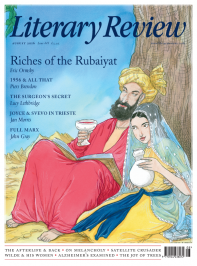David Ekserdjian
Talents of Two Cities
National Gallery Catalogues: The Sixteenth Century Italian Paintings – Volume III, Bologna and Ferrara
By Giorgia Mancini & Nicholas Penny
National Gallery Company 536pp £75
Between 1945 and 1975, the National Gallery issued a complete series of scholarly catalogues of its collection that set the standard for such publications. Distinguished both for their unrivalled attention to detail and for their depth of learning (the entry on Leonardo’s The Virgin of the Rocks includes no fewer than ninety-seven footnotes), they were produced under the aegis of Martin Davies, who went on to become the director of the gallery. Thirty years may seem a long time to have taken to complete such a project, but the fact of the matter is that rival institutions such as the Louvre, the Prado and the Uffizi, whose holdings are admittedly considerably more daunting in scale, have even now scarcely begun to follow Trafalgar Square’s lead.
In 1998, the National Gallery inaugurated a new and incomparably more detailed series of collection catalogues, of which this is the ninth to appear, and the third to be written by Nicholas Penny, in this case in collaboration with Giorgia Mancini. Like Martin Davies before him, Penny is an eminent

Sign Up to our newsletter
Receive free articles, highlights from the archive, news, details of prizes, and much more.@Lit_Review
Follow Literary Review on Twitter
Twitter Feed
Under its longest-serving editor, Graydon Carter, Vanity Fair was that rare thing – a New York society magazine that published serious journalism.
@PeterPeteryork looks at what Carter got right.
Peter York - Deluxe Editions
Peter York: Deluxe Editions - When the Going Was Good: An Editor’s Adventures During the Last Golden Age of Magazines by Graydon Carter
literaryreview.co.uk
Henry James returned to America in 1904 with three objectives: to see his brother William, to deliver a series of lectures on Balzac, and to gather material for a pair of books about modern America.
Peter Rose follows James out west.
Peter Rose - The Restless Analyst
Peter Rose: The Restless Analyst - Henry James Comes Home: Rediscovering America in the Gilded Age by Peter Brooks...
literaryreview.co.uk
Vladimir Putin served his apprenticeship in the KGB toward the end of the Cold War, a period during which Western societies were infiltrated by so-called 'illegals'.
Piers Brendon examines how the culture of Soviet spycraft shaped his thinking.
Piers Brendon - Tinker, Tailor, Sleeper, Troll
Piers Brendon: Tinker, Tailor, Sleeper, Troll - The Illegals: Russia’s Most Audacious Spies and the Plot to Infiltrate the West by Shaun Walker
literaryreview.co.uk